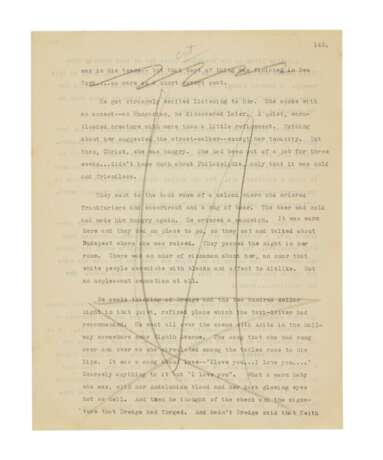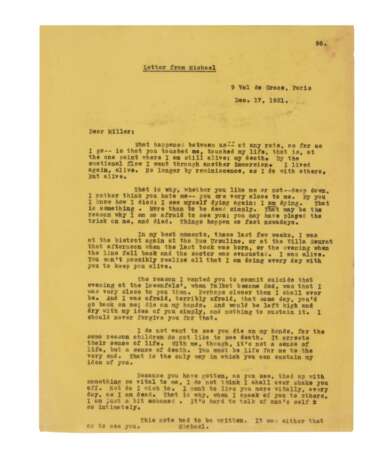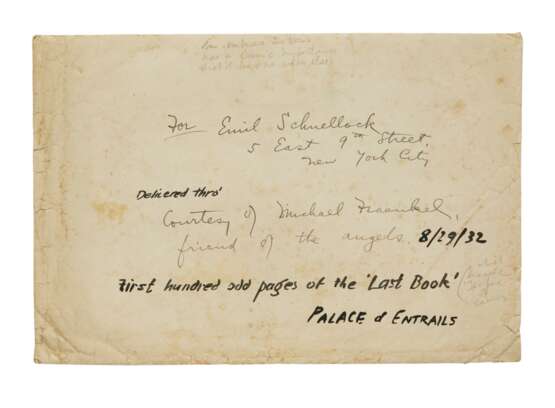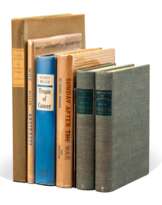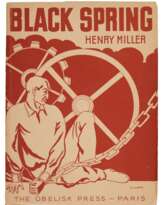Miller, Henry | Typescript of The Last Book, a working title for Tropic of Cancer, written circa 1931–1932
08.12.2023 12:00UTC -04:00
Classic
Startpreis
100000USD $ 100 000
| Auctioneer | Sotheby´s |
|---|---|
| Veranstaltungsort | Vereinigten Staaten, New York |
Archiv
Die Auktion ist abgeschlossen. Es können keine Gebote mehr abgegeben werden.

ID 1111103
Los 68 | Miller, Henry | Typescript of The Last Book, a working title for Tropic of Cancer, written circa 1931–1932
Schätzwert
$ 100 000 – 150 000
Typescript of The Last Book, a working title for Tropic of Cancer, written circa 1931–1932 in Paris, published by The Obelisk Press in 1934
112 pages (varying in size, but mostly 270 x 210 mm) a mixture of ribbon and carbon on different paper stocks; about 25 leaves on the versos of discarded typescript, many of which bear notes and corrections in Miller's hand. Pages numbered: 1-53; 48-50[b]; 54-68, 70-80; and 91-120; pages 10-14, 28-35, and 91-120 are early carbon copies; some pages browned and somewhat brittle, scattered light soiling and edgewear, leaves occasionally trimmed shorter. With the original envelope addressed by Miller: "For Emil Schnellock... Courtesy of Michael Fraenkel," dated "8/29/32" and annotated: "First hundred odd pages of the 'Last Book' Palace of Entrails"; envelope worn and stained. Each leaf inserted into a protective sleeve within a red cloth folder, further contained in a slipcase with folding chemise.
Evidently the earliest surviving substantial typescript of Tropic of Cancer; one of the most famous and influential novels of the twentieth century.
Written in Paris in 1932 and 1933, Tropic of Cancer is an autobiographical novel, based largely on Henry Miller's experiences living in Paris: the activities of his friends, his sex-life, his tempestuous relationship with his wife June Mansfield and the difficulties and triumphs of managing to exist with almost no money.
Tropic of Cancer was Miller’s first published book, appearing in September 1934 in Paris under the imprint of the Obelisk Press. It immediately attracted attention: Ezra Pound wrote to Miller that the book had “out Ulyssessed Joyce” and made a contribution to literature infinitely more valuable than that of the “weak-minded Woolf female.” T.S. Eliot wrote that “Tropic of Cancer seems to me a very remarkable book … a rather magnificent piece of work. There is writing in it as good as any I have seen for a long time. Several friends to whom I have shown it, including Mr. Herbert Read, share my admiration … Without drawing any general comparisons your own book is a great deal better both in depth of insight and of course in the actual writing than Lady Chatterley’s Lover.”
The 20-year old Lawrence Durrell told Miller that “it strikes me as the only really man-sized piece of work which this century can boast of.” George Orwell reviewed the book favorably, as did Blaise Cendrars, the Swiss-French writer whom Miller greatly admired, while Marcel Duchamp praised Tropic of Cancer to everyone in Paris.
On the other hand, George Bernard Shaw stated that “this fellow can write, but he has totally failed to give any artistic value to his verbatim reports of bad language” and Pound, giving the book to a friend, commented that it was a dirty book worth reading. Failing to appreciate Miller’s achievement in writing about sex realistically with joy and humor and without salaciousness or inhibition, Tropic of Cancer was widely regarded as pornographic and banned in most countries, including the United States and England, as were most of Miller’s subsequent books.
Miller returned to the United States at the beginning of World War II. After the War, complaint was brought against his work in France under the 1939 anti-pornography law. The case caused a massive furor in France with the most eminent intellectuals standing behind Miller and the case was finally dropped. In the meantime an American bookseller was sentenced to three years in jail for selling the two Tropics. With his growing international reputation, Miller found himself in the anomalous position of being one of the best-known American writers while his most famous works were unobtainable in America. Various expedients were discussed for getting round the censor and there was an active trade in smuggling his works into the U.S.
Then Barney Rosset of the Grove Press proposed to publish Tropic of Cancer in the United States and challenge the censorship laws head on. The book thus received its first U.S. publication in 1961 and became a huge bestseller, selling 100,000 copies in hardcover and over a million in paperback in the first year. About 60 lawsuits around the country were brought against booksellers and the Grove Press in that year and American writers, include Bellow, Dos Passos, Hellman, Mailer, Malamud and Styron, rallied to Miller’s cause. In 1964 the District Attorney of Brooklyn put out a warrant for Miller’s arrest for obscenity. The first went to the Supreme Court, which found Miller in an historic decision which effectively broke the back of America’s censorship laws.
Henry Miller started Tropic of Cancer (first planned to be called The Last Book, then Tropic of Capricorn) when sharing an apartment in Clichy with Alfred Perlès. Miller wrote fast and fluently, drawing on the massive quantity of material he recorded in his notebooks, his letters, and his earlier unpublished work Crazy Cock. Tropic of Cancer was much added to, revised, and cut before it reached publication and as a result, surviving typescripts present a bewildering mass of different sections, inserts, variations, and paginations.
As seen in the present typescript, Miller did not initially disguise the names of his friends who appear in the book, and the first page here refers to Michael Fraenkel and Villa Seurat rather than Boris and Villa Borghese. At his friends' insistence he later adopted fictional names, among them Michael Fraenkel (who would become Boris), Ossip Zadkine (Borowski), Alfred Perlès (Carl), June Mansfield (Mona), Joe and Bertha Shrank (Sylvester and Tania), and Richard Osborn (Fillmore). Miller speaks to this directly on page six of this typescript, in which he writes: "I showed Michael a few pages that I have written. He does not like me to use his name. I told him I would substitute another, but I have no intention of doing so. The situation calls for real names ... This is not a book, in the ordinary sense of the word. This is libel, slander, defamation of character. There would be no joy otherwise in writing it."
This typescript is evidently the earliest surviving substantial draft of Tropic of Cancer, bearing both the earlier working title ("The Last Book"), and utilizing the real names of Miller's friends who served as his literary fodder. Miller entrusted this draft to Michael Fraenkel midway through its development (the envelope is dated 29 August 1932), to deliver it to Emil Schnellock in New York. Schnellock was Miller's childhood friend from Brooklyn, who Miller referred to as his "literary executor." It differs substantially from not only the published text, but also from the corrected typescript now held at Yale University.
In 1986 Sotheby's handled the sale of the corrected typescript of Tropic of Cancer, which sold for a record-setting $165,000, at the time the highest price at auction for a modern manuscript sold in America. That version had been on deposit at UCLA prior to the 1986 auction, and is now part of the Frederick R. Koch collection at Yale University. The UCLA/Yale copy bears the title "Tropic of Capricorn," with the terminal word crossed out and supplied with the corrected: "Cancer," placing it later in the chronology of Miller's development of the novel. It is evident the Yale typescript has taken this manuscript in parts, and corrected and amended it with pseudonymous names, and additional text.
An important addition to our understanding of the genesis and composition of Tropic of Cancer, which is one of the prime sources for the study of Henry Miller.
| Künstler: | Henry Valentine Miller (1891 - 1980) |
|---|---|
| Kategorie des Auktionshauses: | Drucke, Graphik, Bücher |
| Künstler: | Henry Valentine Miller (1891 - 1980) |
|---|---|
| Kategorie des Auktionshauses: | Drucke, Graphik, Bücher |
| Adresse der Versteigerung |
Sotheby´s 1334 York Avenue 10021 New York Vereinigten Staaten | ||||||||||||||
|---|---|---|---|---|---|---|---|---|---|---|---|---|---|---|---|
| Vorschau |
| ||||||||||||||
| Telefon | +1 212 606 7000 | ||||||||||||||
| Nutzungsbedingungen | Nutzungsbedingungen | ||||||||||||||
| Geschäftszeiten | Geschäftszeiten
|





